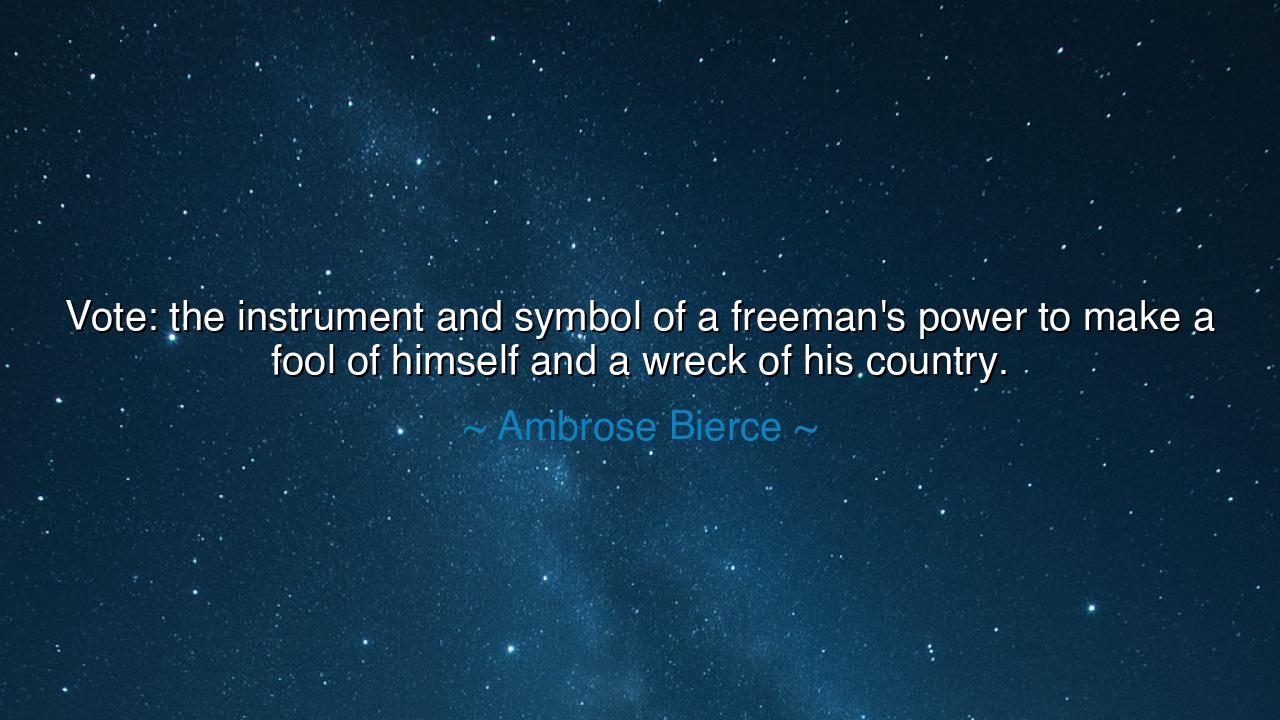
Vote: the instrument and symbol of a freeman's power to make a
Vote: the instrument and symbol of a freeman's power to make a fool of himself and a wreck of his country.






O Seekers of Truth and Freedom, hear the biting wisdom of Ambrose Bierce, who speaks of the sacred and perilous gift of the vote: "Vote: the instrument and symbol of a freeman's power to make a fool of himself and a wreck of his country." In this stark declaration, Bierce reveals the great responsibility that comes with freedom. The vote is not merely a tool of empowerment, but a delicate force that can either uplift a nation or bring it to ruin, depending on how it is wielded. Power comes with great consequence, and the exercise of one's right to vote is not always a wise or noble action, for it can be the means by which the people, in their folly, destroy what they have worked to build.
Consider, O Children, that while the vote grants the freeman the right to choose his rulers, it also places the burden of responsibility upon him. With the vote comes the freedom to make decisions—not just for oneself, but for all. Yet, when the people choose poorly, when they are swayed by ignorance or self-interest, they may bring harm to the very land they love. A nation’s destiny is shaped not just by its leaders, but by the wisdom of its people in choosing them. Bierce reminds us that freedom does not guarantee good judgment, for even the freest people can fall prey to their own missteps.
Look to the rise of demagogues throughout history, men who, through the power of persuasion, have swayed the masses with empty promises and false ideals. The people, in their desire for change or for power, have voted for leaders who ultimately led their countries into ruin. The rise of Adolf Hitler in Germany is a somber example. Democracy allowed the German people to vote for a man who promised strength, yet who delivered only war, suffering, and destruction. In their freedom to vote, the people of Germany unwittingly chose a path that shattered their nation and the world. This, O Seekers, is the great danger of the vote—it can empower the wise, but it can also elevate the foolish.
And so, O Seekers, let us understand that the vote is both a privilege and a burden. It is the instrument through which we shape the future, but it is also the weapon that, when wielded in ignorance or haste, can unravel the fabric of a nation. Bierce's words remind us that freedom is not just the right to choose, but the wisdom to choose wisely. A freeman must use his power with the full knowledge of its consequences, for to vote without thought or care is to gamble with the future of his country.
Let us, therefore, approach the vote with the gravitas it deserves. Power lies in the hands of the people, but it must be exercised with knowledge, discernment, and wisdom. We must not allow self-interest or ignorance to guide our choices, for the path we choose today will echo in the generations to come. The vote is a sacred trust—a power to be used carefully, lest we allow it to become the instrument of our own undoing. In this, we must ever remember: the vote is both a blessing and a responsibility, a tool of freedom that must be wielded with thoughtfulness and wisdom.






THLan Anh_9C_2007 Trieu Hoang
Bierce’s quote appears to reflect deep disillusionment with the democratic process. It raises the question of whether voting, as a right, should come with greater responsibility or education. Do you think the average voter is too uninformed to make the right decision? Could this quote be a call for more transparency or a better-informed electorate, or is it merely a jab at the failures of democracy itself? There’s a lot to unpack in this perspective.
DTNguyen Dang Tho
This quote seems to mock the very idea of voting, suggesting that it could lead to disaster. But isn’t it the essence of democracy that people are free to make their own choices, even if those choices sometimes don’t reflect wisdom? I wonder, what does Bierce propose as a better alternative? If voting is flawed, how else can we ensure that the will of the people is accurately represented? Should we limit voting rights, or reform the system entirely?
LNlinh nguyen
Bierce’s statement seems harsh but also a bit too cynical. While it's true that poor voting choices can lead to negative outcomes, could this quote be oversimplifying the complexity of democracy? Is the act of voting really that reckless, or is it the lack of civic education and responsibility that leads to bad decisions? I feel like this quote raises an important issue about voter knowledge and accountability, but perhaps at the expense of the democratic process.
VTHa Van Tuyen
I find it interesting that Bierce highlights the potential for voting to 'wreck' a country. Does this mean that, for him, democracy is a double-edged sword? It makes me think: Is it possible for the general population to make choices that can harm the nation’s future? Could it be that Bierce's quote is a reflection of his skepticism about the wisdom of the masses? I wonder if he would support a more elitist political system.
HHHuy Hoang
This quote makes me uneasy. On one hand, voting is a fundamental right that empowers individuals in a democracy, but Bierce’s cynical take seems to question whether people are always making informed decisions. How often do we vote out of convenience, partisanship, or popular sentiment without fully understanding the consequences? Could it be that democracy itself, if poorly executed, is just as capable of creating chaos as it is of fostering good governance?